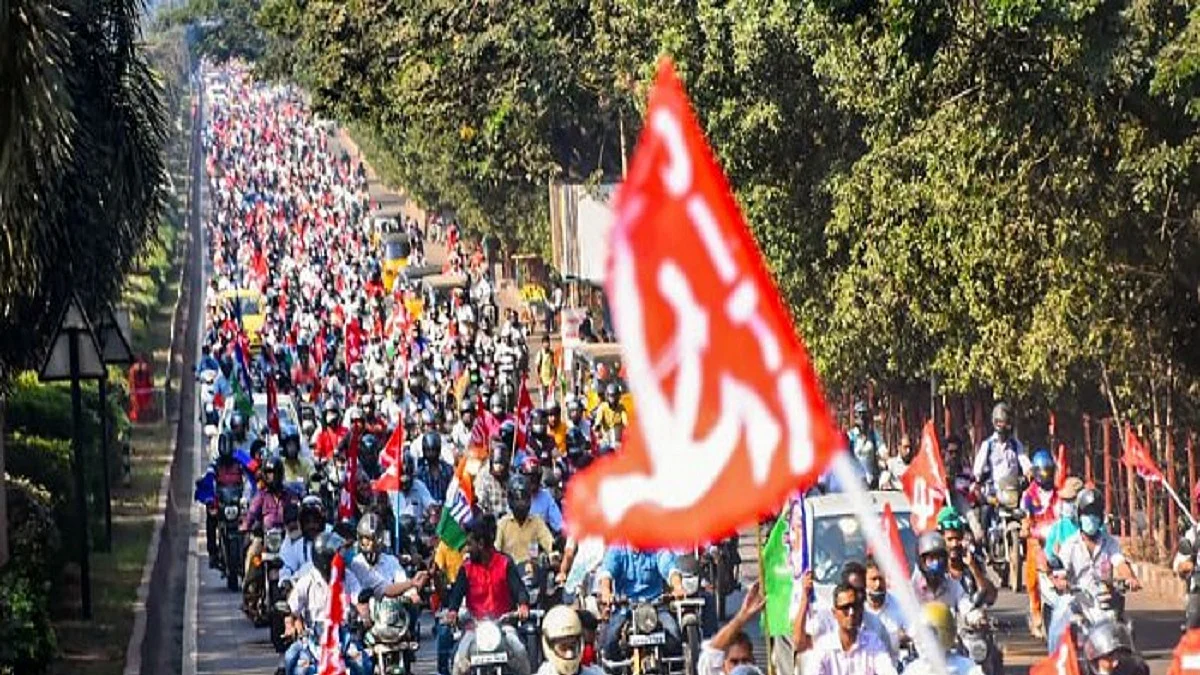Anti-Privatisation day on March 15: Modi govt policies getting resistance from both workers and farmers
Farmers, workers, and employees working in PSUs have gathered their strength and joined hands to oppose Modi government’s moves to sell the public sector undertakings

With observance of Anti-privatisation Day on March 15, 2021, the movement against proposed large scale privatisation of Public Sector Undertakings in India will enter a new phase, during which the Modi government will have to face stiff organised resistance not only from the workers’ union of the PSUs but also from the unions, federations, and employees associations from other sectors. Farmers’ unions joining hands for joint call for observance of the Anti-privatisation Day, and support from large number of people’s organisations from other sectors will only strengthen the movement.
The Anti-privatisation Day has now become a joint call of the farmers’ unions under the Samyukta Kisan Morcha (SKM) and the 10 Central Trade Unions (CTUs). It was initially CTUs call, but later in a significant move, SKM supported it. Additionally, the Bank Unions have also called for two days strike on March 15 and 16 against the government’s plan to privatize public sector banks. Their strike is supported by All India Power Engineers Federation along with 24 Federations of unions, separate unions, associations of workers of different sectors, and people’s organizations. SKM has also extended support to striking bank employees. GIC unions have called for strike on March 17, and the life insurance unions on March 18, which are also supported by CTUs and SKM. The first four days of the week beginning from March 15 will thus witness convergence of all shades of workforce and people opposing privatisation of PSUs in India which they believe to be anti-people and pro-corporates. It would pave the way for further combative struggles including multiple days strike in the days to come to fight, defy, and resist the privatisation move.
All these are indicative of stiffer united resistance to the government’s large scale privatisation plan of the PSUs, including the Railways and Banks. The Union Budget 2021-22 has specific proposals of privatisation of PSUs in the current financial year, and has also indicated to continue the privatisation drive in the years to come. Having failed in taming the economic crisis, the government hopes to raise much needed fund by selling the PSUs. It is but a lenient view about the government’s action.
A more critical view suggests some ulterior motive of the rulers in the helm of affair who are hell bent on helping corporate sector to have more riches compared to others, especially the poor farmers and the working class. The three farm laws brought by the Modi government have tried to take the corporate sectors to the farms, and the four labour codes give them the power to grind the interests of the working class. The steps have already made farmers and workers angry enough to stage protest against the government’s moves, but the Union Budget 2021-22 have infuriated them by the proposal of privatisation of the PSUs in a big way.
The agreement reached between the farmers’ unions of the country under the Samyukt Kisan Morcha banner and the 10 central trade unions to carry out a joint campaign, combining their demand and planning common actions is not a small thing, because they have earlier been agitating and protesting against the government’s moves separately. Together, they have now become stronger. The observance of anti-privatisation day is only the beginning of the next phase of the movement. Several other protests and agitations have been planned which include martyrdom day of Bhagat Singh, Sukhdev and Rajguru on March 23 and Bharat Bandh on March 26. AITUC general secretary Amarjeet Kaur terms the joint action plan of farmers’ unions and central trade unions ‘a big boost for all the forces who have faced discrimination or oppression from the present regime.’
Striking Bank Unions have said in their statement that the privatisation of public sector banks is an anti-worker, anti-people, and anti-social step. They claimed that the privatisation of public sector undertakings has led to hundreds of workers getting thrown out of their jobs and has also led to the increase in the use of contract workers who are employed at one-third to one-fourth the wages of regular workers. They have pointed out the risks of privatizing the public sector banks. “If privatized, the banks will no more be run for fulfilling social needs but purely in pursuit of private profit. After private banks entered the field, banking services have become much more expensive. Many people will soon find services unaffordable,” the agitating bank employees emphasize.
Bank employees are not only opposing privatisation in banking sector only, but they are opposing all privatisation moves of PSUs in general. They have also strongly opposed the central government’s policies to privatise electricity in all UTs and the recent move to Electricity Act 2003 to allow private players to enter power and distribution in all states in the country. They have also alleged that central government policies are totally against the public sector working in every sector of the economy and are designed to favour the corporate of selected corporate houses. AIPEF has further alleged that even in the move to privatise selected banks, there is a hidden motive to gift them to the selected corporates.
Prime Minister Narendra Modi has categorically stated that the government has no business to remain in business. Farmers, workers, and employees working in PSUs have also gathered their strength and joined hands to oppose his government’s moves to sell the public sector undertakings. The clash between the two opposing forces seems to be imminent, and the unrest brewing in the country may most likely escalate if government goes ahead with its plan to sell the PSUs indiscriminately to the private sector.
(IPA Service)
Follow us on: Facebook, Twitter, Google News, Instagram
Join our official telegram channel (@nationalherald) and stay updated with the latest headlines
